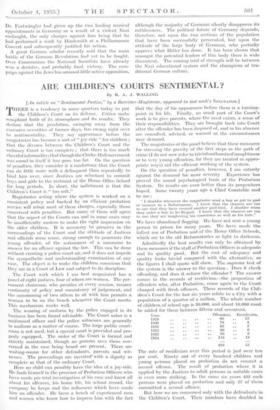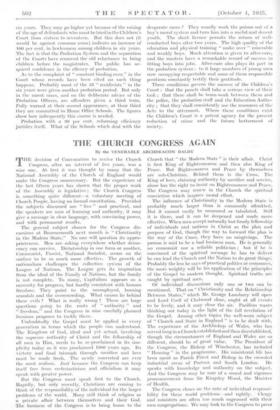ARE CHILDREN'S COURTS SENTIMENTAL ?
By R. A. J. WALLING [An article on "Sentimental Justice," by a Barrister-Magistrate, appeared in last week's SPECTATOR., THERE is a tendency in some quarters today to put the Children's Court on its defence. Critics make complaint both of its atmosphere.and its results.' They • declare that the pendulum, swinging away from the excessive. severities of former days, has swung right over to . sentimentality. They say appearance before the i magistrates has become a sort of " joy-ride " for children ; that the divorce between the Children's Court and the ordinary. Court is too complete ; that there is too much cheerful informality; that though the Clarke-Hall movement was sound in itself it has gone too far. On the question . of penalties, they consider it a. misfortune that the Court can do little more with a delinquent than repeatedly to ,bind him over, since Justices are reluctant to commit .boys and girls to the restraint of the Home Office School for long periods, In short, the indictment is that the Children's Court is." too soft."
.Magistrates acting where the system is worked on a consistent. policy and backed by an efficient, probation service will rebut most of these charges, especially those concerned with penalties. But many of them will agree that the aspect of the Courts can and in some cases may be insufficiently austere to .make the right impression on the older children. It is necessary to preserve in the surroundings of the Court and the attitude of Justices and officials some sense, strong enough to penetrate the young offender, of the seriousness . of a summons. to answer for an offence against the law. This can be done without creating a police-court air,,and it does not impede the sympathetic and understanding examination of any case, The object is to make the children conscious that they are.iri R.Courtof Law and subject to its discipline..
The Court with which I am best acquainted. has a panel of eight justices, four of whom are women. The per- manent. chairman, who presides at every .session, insures continuity of policy and consistency of judgement, and the summoning of two others to sit with him permits a. woman to be. on the bench whenever the. Court meets. This mechanism works well.
. The, wearing of uniform by the police engaged in its business has been found advisable. The. Court usher is a uniformed officer and 'the police. witnesses are generally in uniform as a matter of course. The large public court- room is not used, but. a special court is provided and pro- perly equipped. The. order of the Court is formal and strictly maintained, though no persons save those ton- aerned in the case being heard are present. There are Waiting-rooms for other defendants, parents and wit- nesses. •The proceedings are invested' with a dignity as Complete as that of the ordinary Court. .
• Here no child can possibly have the idea of a. joy-ride. He finds himself in the presence of Probation Officers who have made pre-trial investigation of his ease and know all about his offences, his home• life, his school record, the Company he keeps and the influences which have . made him an. offender. He faces a bench of experienced men and women who know how to impress him with the fact that the day of his appearance before them is a turning- point in his life. Finally, no small part of the Court's work is to give parents, where the need exists, a sense of their responsibilities. They are brought back into Court. after the offender has been disposed of, and in his absence are consulted, advised. or warned as the circumstances may demand.
The magistrates of the panel believe that these measures for stressing the gravity of the first steps in the path of crime (I do not now refer to trivial outbursts of naughtiness or to very young offenders, for they are treated in appro- priate ways) aid the efficient working of the system: •• On the question of penalties, however, 1 am entirely against the demand for more severity Experience has proved the sound psychological basis of the Probation System. Its results are even better than its progenitors hoped. Some twenty years ago a Chief Constable said to me : ". Z shudder whenever the magistrates send a boy or girl to gaol or commit to a Reformatory. I know that the chances are ten to, one that they have created another gaol-bird. I shudder when they order a' bby to be. flogged. I know that the chances are ten to one they are toughening his conscience as well as his hide."
We have abandoned flogging. We have not sent a young person to prison for many years. We have made the fullest use of Probation and of the Home Office Schools, which are to the old Reformatories as light to darkness.
• Admittedly the best results can only be obtained by these measures if the staff of Probation Officers is adequate and its quality good. But the cost of adequacy and quality looks trivial compared with the alternative,' as the figures I shall quote will show. The supreme test. of the system is the answer to the question : Does it check offending, and does it reform the offender ? • The answer comes in the records of recidivism—the proportion of offenders who, after Probation, come again to the Court charged with fresh offences. •• These records of the Chil- dren's Court for the last six years relate to a City with a population of a quarter of a million. The whole number of children. of school age is 30,000, and about 10,000 must be added for those between fifteen and seventeen.
Year., 1929 1930 1931
• • • • • • •
Offenders. 60 78 62 • •
Recidivists. 13 4 3
1932
••• 10,10
80 • • 6
1933
• • • •
95 • •
9 1934
• •
118 .. 18 493 53 The rate of recidivism over this period is just over ten per cent. Ninety out of • every hundred children and young persons placed on probation do not commit a second offence. • The result of probation where it is applied by the Justices to adult persons in suitable cases is even more striking. In the same six years 432 such persons were placed on probation and only 27 of them committed a second offence.
But here we are concerned only with the defendants in the Children's Court. Their numbers have doubled in six years. They may go higher yet because of the raising of the age of defendants who must be tried in the Children's Court from sixteen to seventeen. But this does not (it would be against common sense) indicate an increase of 100 per cent. in lawlessness among children in six years. The fact is that the Probation System and the separation of the Courts have removed the old reluctance to bring children before the magistrates. The public has ac- quired confidence in the efficacy of probation.
As to the complaint of " constant binding over," in the Court whose records have been cited no such thing happens. Probably most of the 58 " recidivists " in the six years were given another probation period. But only in the rarest cases, and on the deliberate advice of the Probation Officers, are offenders given a third term. Fully warned at, their second appearance, at their third they arc committed to Home Office Schools. The figures .show how•infrequently this course is needed.
, Probation with a 90 per cent. reforming efficiency justifies itself. What of the Schools which deal with the desperate cases ? They usually work the poison out of a boy's moral system and turn him into a useful, and decent youth. The short licence permits the return of well, conducted boys after two years. The high quality of the education and physical training " make over." miserable and weakly boys. Much attention is given to after-care, and the masters have a remarkable record of success in fitting boys into jobs. After-care also plays its part in the probation system : to it large numbers of young Men now occupying respectable and some of them responsible positions constantly testify their gratitude.
Three conditions govern the success of the Children's Court : that the panels shall take a serious view of their task ; that there shall be team-work between them and the police, the probation staff and the Education AuthoL rity ; that they shall consistently use the resources of the Acts to the uttermost. 'Where these conditions exist the Children's Court is a potent agency for the present reduction of crime and the future betterment of society.











































 Previous page
Previous page